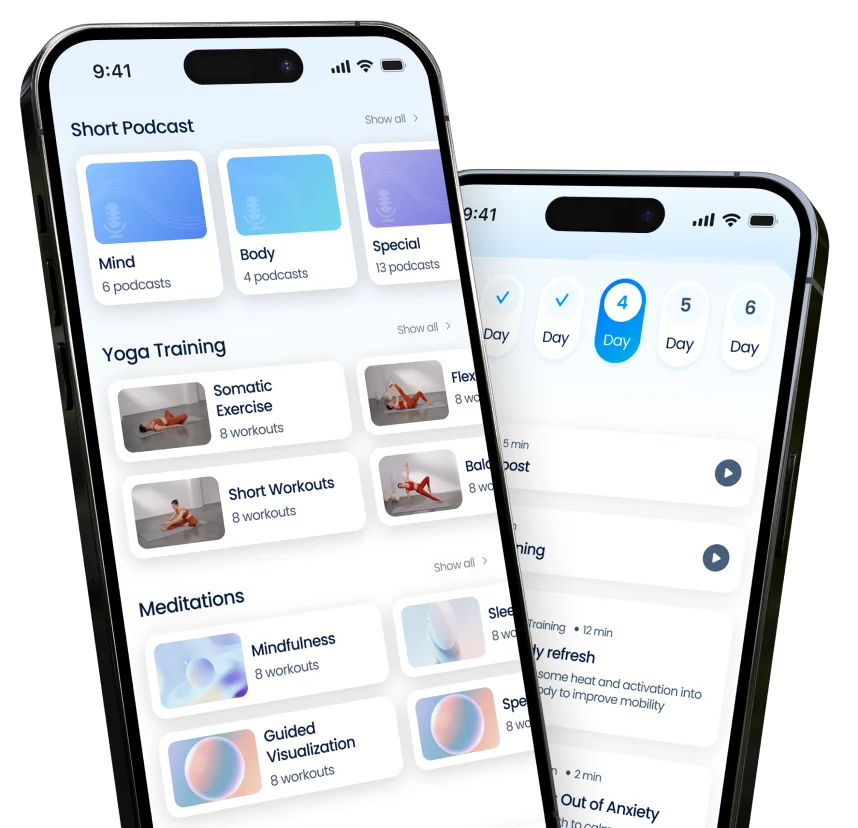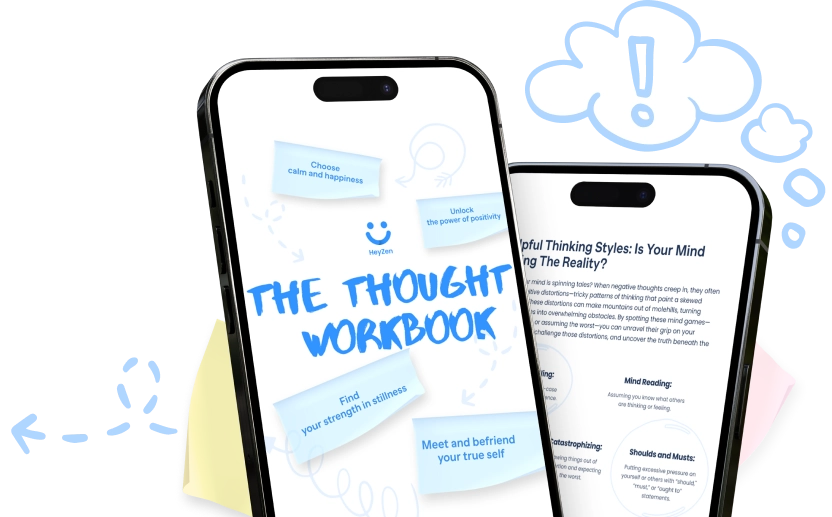Top 15 Mental Health Apps: Your Digital Wellness Guide for 2025 (Update)

In the digital era, mental health apps are transforming emotional well-being by offering accessible and convenient support. These innovative tools provide flexible solutions for managing mental challenges directly from our smartphones. From specialized apps for teens to all-in-one wellness platforms, technology is reshaping how we care for our minds.
The growth of digital mental health support is rapid and impactful. With just a few taps, users can access therapy connections, meditation guides, mood tracking, and self-help resources. More than just tech innovations, these apps break traditional barriers by offering confidential, anonymous support that seamlessly integrates into daily life. Whether you need stress relief strategies or deeper therapeutic guidance, mental health apps are redefining psychological resilience and self-care.
Table of Contents
Introduction to mental health apps
Key characteristics
These distinguish themselves through several core attributes:
- Accessibility: Available 24/7 on personal devices.
- Anonymity: Enable private support.
- Affordability: Often cheaper than traditional therapy.
- User-Friendly: Designed with intuitive interfaces.
App categories and functions
- Therapy connection apps
– Link users with licensed professionals.
– Offer video and text-based counseling options. - Meditation and mindfulness apps
– Provide guided relaxation techniques.
– Include breathing exercises.
– Support stress reduction practices. - Mood tracking apps
– Monitor emotional patterns.
– Help identify potential triggers.
– Enable personalized insights.
Technology and mental wellness
Digital health platforms leverage smartphone technology to democratize mental health resources. These apps transform personal devices into powerful wellness companions, integrating easily with users’ daily routines and providing immediate, discrete support mechanisms.
Best apps for mental well-being
We’ve carefully curated a selection of mental well-being apps that address diverse psychological wellness needs, offering targeted support across different mental challenges.
Best for talk therapy: BetterHelp

BetterHelp provides comprehensive online therapy solutions connecting users with licensed therapists. Our research reveals the platform offers weekly talk therapy sessions via multiple communication channels including video, audio, and text chat. Users receive 24/7 unlimited messaging with assigned therapists specializing in areas like anxiety, depression, relationship issues, and trauma.
Best for depression: Talkspace
Talkspace emerges as a premier digital platform for depression management. Research-backed studies indicate the app’s messaging therapy approach effectively reduces depressive symptoms. Users access licensed therapists through voice, video, and text features with flexible communication options designed to accommodate individual preferences.

Best for anxiety: Worry Watch

Worry Watch specializes in anxiety management through advanced mood tracking and cognitive behavioral techniques. The app enables users to document anxiety triggers, analyze patterns, and develop personalized coping strategies. Its intuitive interface helps individuals recognize and mitigate anxiety-related challenges.
Best for mindfulness: Headspace
Headspace delivers structured meditation and mindfulness experiences tailored for different skill levels. The app offers guided meditation sessions addressing stress reduction, focus improvement, and emotional regulation. Users can select from multiple themed meditation programs targeting specific wellness goals.

Best for sleep: Calm

Calm provides comprehensive sleep improvement resources including guided sleep meditations, relaxing soundscapes, and sleep stories. The platform employs evidence-based techniques to help users establish healthy sleep routines and address insomnia-related challenges.
Best for addiction recovery: I Am Sober
I Am Sober supports individuals navigating substance abuse recovery through goal tracking, community connections, and progress monitoring. The app enables users to log sobriety milestones, track financial savings, and build supportive networks.

Best for kids: Breathe, Think, Do With Sesame

Breathe, Think, Do with Sesame offers child-friendly emotional intelligence resources using Sesame Street characters. The app teaches children essential coping skills through interactive scenarios and age-appropriate problem-solving strategies, self-control skills, and task persistence.
Best for positive thinking: Happify
Happify combines scientific research with engaging activities designed to boost emotional well-being. The app provides science-based games and activities targeting positive psychology principles, helping users develop resilience and optimistic thinking patterns.

Best for mood tracking: Daylio Journal

Daylio Journal enables comprehensive mood tracking through intuitive logging mechanisms. Users can document daily emotions, activities, and personal insights, generating detailed analytics about their psychological patterns.
Best for crisis prevention: notOK
notOK provides immediate support during mental health emergencies by connecting users with pre-selected trusted contacts. The app serves as a critical intervention tool for individuals experiencing acute emotional distress.

Best for eating disorders: Recovery Record

Recovery Record offers specialized support for individuals managing eating disorders. The app facilitates meal tracking, cognitive behavioral therapy techniques, and professional treatment coordination.
Best for OCD: NOCD
NOCD delivers specialized obsessive-compulsive disorder management through evidence-based treatment approaches. The platform connects users with OCD-specialized therapists and provides structured exposure response prevention techniques.

Best for reducing alcohol consumption: Reframe

Reframe supports individuals seeking to modify alcohol consumption patterns through personalized coaching and behavioral modification strategies. The app provides scientific insights, tracking tools, and motivational resources for sustainable lifestyle changes.
Comprehensive comparison of top mental health apps
| App Name | Primary Focus | Key Features | Price Range | User Rating |
|---|---|---|---|---|
| BetterHelp | Talk Therapy | Online counseling, text/video sessions | $60-$90/week | 4.5/5 |
| Talkspace | Depression Management | Personalized therapy, psychiatric services | $69-$129/week | 4.3/5 |
| Headspace | Mindfulness | Guided meditations, stress reduction | $12.99/month | 4.8/5 |
| Worry Watch | Anxiety Tracking | Mood logging, anxiety pattern recognition | $2.99 | 4.2/5 |
| Calm | Sleep Improvement | Sleep stories, meditation tracks | $14.99/month | 4.7/5 |
Our comprehensive analysis evaluated 55+ apps across critical dimensions:
1) Evidence-based methodology
- Apps developed using validated psychological research.
- Therapies grounded in cognitive behavioral techniques.
- Professional expert involvement in app development.
2) Therapeutic diversity
- Multiple intervention strategies.
- Support for various mental conditions.
- Personalized treatment approaches.
3) Accessibility features
- Cross-platform compatibility.
- User-friendly interface design.
- Seamless navigation experiences.
4) Cost effectiveness
- Tiered pricing models.
- Affordable subscription options.
- Flexible payment structures.
5) User Experience Metrics
- Consistent app performance.
- Regular content updates.
- Positive user feedback mechanisms.
Apps for mental wellness represent advanced digital interventions enabling personalized psychological support. So, our evaluation prioritized apps offering comprehensive, scientifically-validated approaches to emotional wellness.
Our key evaluation criteria
| Evaluation Metric | Assessment Parameters |
|---|---|
| Research Validation | Clinical evidence support |
| Technical Stability | App performance and reliability |
| Therapy Options | Variety of intervention strategies |
| Pricing | Affordability and value proposition |
| User Feedback | Aggregate ratings and reviews |
The science behind mental health apps
Research increasingly validates digital mental health interventions through empirical evidence. Mental wellness professionals recognize app-based platforms as emerging tools for psychological support, with specific apps demonstrating measurable therapeutic potential.
Evidence-based methodologies
Researchers have identified key scientific parameters determining app effectiveness:
- Clinical validation: Apps using established psychological frameworks like cognitive behavioral therapy (CBT).
- Personalization algorithms: Platforms offering adaptive feedback mechanisms.
- Data-driven interventions: Applications tracking user progress and adjusting recommendations.
Research insights
Studies reveal nuanced perspectives on digital mental support:
- Horwitz notes that most mobile-based mental wellness apps lack objective research scrutiny.
- Certain platforms like Headspace and Silvercloud demonstrate more substantial evidence.
- Personalized feedback messages show promising improvement potential.
Psychological impact considerations
Expert analysis highlights complex factors influencing app effectiveness:
- Digital placebo effect potentially generates symptom relief.
- Motivation levels of users significantly impact intervention outcomes.
- Selection bias among app users seeking proactive mental health support.
Our understanding of mental wellness apps continues evolving through rigorous scientific examination, emphasizing the importance of ongoing research and critical evaluation.
Privacy and data security
Mental wellness apps collect sensitive personal information. Understanding privacy risks becomes critical when using digital mental health platforms. We’ll explore key privacy considerations to protect your confidential data.
Data sharing practices
Mental wellness apps can share user data beyond therapy sessions. Features like mood logs, CBT exercises, and meditation records may not maintain HIPAA confidentiality. The information you provide can potentially be:
- Sold for targeted advertising.
- Shared with public health organizations.
- Used for academic research.
- Distributed to third-party platforms.
Privacy policy recommendations
To safeguard personal information, we recommend:
- Check if you enabled data sharing with an app and if it’s going to share your data with third-party companies.
- Thoroughly review each app’s privacy policy.
- Understand data collection and sharing practices.
- Check for HIPAA compliance in therapy communication.
Protective strategies
Implement these privacy protection techniques:
- Create a dedicated email address.
- Use private WiFi during online therapy sessions.
- Choose personal devices for app interactions.
- Generate strong unique passwords.
- Use password managers for secure credential storage.
Confidentiality considerations
Privacy protection varies across platforms. HIPAA laws protect therapist conversations but may not cover additional app features. Users must remain vigilant about potential information exposure.
| Practice | Description | Importance |
|---|---|---|
| Email isolation | Use separate email for apps | Prevents comprehensive data breaches |
| Password complexity | Generate unique passwords | Reduces unauthorized access risk |
| WiFi selection | Use private networks | Minimizes potential data interception |
| Device management | Use personal devices | Controls information accessibility |
Choosing the right mental health app for you
Psychologists and therapists recommend evaluating your specific needs and preferences before committing to an app.
Key considerations for selection
Support level assessment
- Evaluate current mental health needs.
- Determine if you require immediate professional intervention.
- Recognize app as a complementary tool to professional therapy.
Personal objectives
- Identify specific goals: meditation, habit development, therapy sessions.
- Match app features to individual mental health objectives.
- Select apps with targeted functionalities: mindfulness, stress relief, habit tracking.
Budget constraints
- Review pricing structures.
- Explore free and low-cost options.
- Check insurance coverage for digital mental health services.
- Look for annual subscription discounts.
- Use free trial periods for app testing.
Communication and feature evaluation
Communication options
- Assess preferred interaction modes.
- Compare therapy platforms offering:
- Live video sessions
- Audio consultations
- Text-based messaging
- Unlimited chat support
App feature analysis
- Examine specific app capabilities.
- Prioritize features like:
- Interactive games
- Mood tracking
- Therapeutic exercises
- Professional guidance tools
Practical selection strategies
- Research multiple app options.
- Read user reviews and professional recommendations.
- Verify app credibility through clinical validation.
- Test app functionality during trial period.
- Assess personal comfort with app interface.
- Confirm data privacy and security measures.
Pay attention to the following red flags in the right app selection:
- Apps without professional credentials.
- Platforms lacking evidence-based methodologies.
- Services with unclear privacy policies.
- Apps making unrealistic mental health promises.
Maximizing the benefits
We’ve identified key methods to optimize digital mental support and maximize app effectiveness.
Strategic app selection
Selecting the right app requires careful evaluation of personal goals and app capabilities. We recommend:
- Matching app features to specific mental health objectives.
- Prioritizing evidence-based therapeutic approaches.
- Assessing user interface and ease of navigation.
- Comparing pricing and subscription models.
- Verifying data privacy and security protocols.
Personalized usage techniques
Effective app engagement demands intentional and consistent interaction. Our research reveals several optimization strategies:
- Set consistent usage schedules.
- Complete initial assessment questionnaires.
- Track progress through integrated monitoring tools.
- Customize notification settings.
- Utilize multiple app features simultaneously.
Integration with professional care
Mental wellness applications function best as complementary tools to professional treatment. We emphasize creating a holistic approach by:
- Discussing app usage with mental health professionals.
- Sharing app-generated insights during therapy sessions.
- Using apps to supplement clinical recommendations.
- Maintaining realistic expectations about digital interventions.
Performance tracking and adaptation
Continuous evaluation ensures sustained app effectiveness. Key tracking methods include:
| Tracking Method | Purpose | Frequency |
|---|---|---|
| Mood logging | Emotional pattern recognition | Daily |
| Goal progress | Intervention effectiveness | Weekly |
| Feature usage | App engagement measurement | Monthly |
| Symptom assessment | Treatment impact analysis | Quarterly |
By implementing these strategies users can transform wellness apps from simple digital tools into powerful personal wellness platforms.
When to seek professional help
Apps can offer valuable support but cannot replace professional intervention in certain critical situations. We’ve identified key indicators that signal the need for expert mental health assistance beyond digital platforms.
Overwhelming symptoms
Severe mental challenges demand professional attention. Persistent anxiety, depression, or trauma symptoms that significantly disrupt daily functioning require personalized therapeutic guidance. A licensed mental health professional can develop a targeted treatment plan addressing individual psychological needs more comprehensively than any app.
Safety concerns
Immediate professional intervention becomes crucial when experiencing:
- Suicidal ideation.
- Self-harm thoughts.
- Acute psychological distress.
- Persistent dangerous emotional states.
Mental health professionals provide critical support networks and can connect individuals with immediate crisis resources to ensure personal safety.
Lack of digital app progress
Digital mental health tools have limitations. Persistent absence of improvement after extended app usage indicates the need for alternative intervention strategies. Professional therapists can:
- Diagnose underlying psychological patterns.
- Offer nuanced treatment approaches.
- Provide personalized therapeutic techniques.
- Address complex emotional challenges.
Complex psychological conditions
Certain mental health conditions require specialized professional assessment:
- Severe clinical depression.
- Bipolar disorder.
- Post-traumatic stress disorder.
- Complex anxiety disorders.
- Eating disorders.
Professional mental health experts can provide comprehensive diagnostic evaluations and integrated treatment plans that mobile applications cannot replicate.
Comprehensive therapeutic assessment
While mental health apps serve as valuable supplementary tools they cannot substitute the depth of professional psychological assessment. Trained therapists conduct holistic evaluations addressing multidimensional aspects of mental wellness that automated platforms cannot comprehensively analyze.
The future
Digital mental health platforms are rapidly evolving with technological advancements and changing user expectations. Our research indicates emerging trends pointing toward more personalized and intelligent mental wellness solutions.
Technological integration and AI
Mental health apps are integrating advanced technologies to enhance user experiences. Artificial intelligence algorithms will enable more precise:
- Personalized intervention strategies.
- Real-time emotional pattern recognition.
- Predictive mental health risk assessments.
- Adaptive therapeutic recommendations.
Expanded therapeutic modalities
Future mental health applications will diversify therapeutic approaches by incorporating:
- Virtual reality exposure therapies.
- Biofeedback mechanisms.
- Neurological tracking systems.
- Comprehensive symptom management protocols.
Privacy and security innovations
Advanced encryption technologies and blockchain frameworks will revolutionize data protection. Key developments include:
- Decentralized user data management.
- Enhanced HIPAA-compliant communication channels.
- Anonymous user experience options.
- Transparent data usage policies.
Global accessibility frameworks
Mental health apps are expanding beyond traditional geographical limitations. Emerging strategies involve:
- Multilingual support platforms.
- Low-bandwidth optimization.
- Cultural context-sensitive interventions.
- Affordable subscription models.
- Evidence-based intervention protocols.
- Longitudinal user outcome tracking.
- Collaborative research partnerships.
- Academic and clinical expertise integration.
Mental health apps in the workplace
These are transforming workplace wellness strategies by providing employees with convenient and discreet support tools. Organizations increasingly recognize the value of digital mental health resources in addressing workplace stress, anxiety, and overall employee well-being.
Workplace mental health challenges
Modern work environments present complex psychological challenges. Employees face unprecedented levels of stress, burnout, and mental health concerns that traditional corporate wellness programs struggle to address. Digital wellness apps offer scalable solutions that:
- Provide 24/7 anonymous support.
- Enable confidential mental health tracking.
- Offer stress management techniques.
- Create personalized wellness interventions.
Benefits for employers and employees
Corporate mental health app adoption delivers significant advantages. Research indicates that comprehensive mental health support can reduce:
| Metric | Impact |
|---|---|
| Workplace absenteeism | 35-40% reduction |
| Employee turnover | 25-30% decrease |
| Productivity loss | Up to 50% mitigation |
Implementation strategies
Successful workplace mental health app integration requires strategic approaches:
- Conduct comprehensive employee needs assessments.
- Select apps with robust privacy protections.
- Offer multiple app options.
- Provide optional app usage with no mandatory participation.
- Ensure HIPAA compliance for all digital platforms.
Technology integration
Advanced mental health apps now feature workplace-specific modules:
- Team stress management tracking.
- Emotional intelligence development.
- Burnout prevention resources.
- Conflict resolution skill-building.
- Meditation and focus improvement techniques.
Measuring app effectiveness
Organizations can evaluate mental health app impact through:
- Employee engagement metrics.
- Anonymous satisfaction surveys.
- Reduced healthcare utilization.
- Performance and productivity indicators.
- Longitudinal wellness trend analysis.
By embracing digital mental health solutions, workplaces create supportive environments that prioritize psychological wellness and foster resilient organizational cultures.
The role of apps in modern mental health care
Mental health apps represent a transformative digital intervention in contemporary psychological support. These mobile platforms bridge critical gaps in traditional mental health services by offering accessible, personalized, and immediate wellness resources.
Research confirms the potential of mental wellness applications to enhance symptom management and treatment engagement. A 2018 review suggests these digital tools effectively monitor and manage mental health conditions by:
- Increasing user engagement.
- Simplifying treatment plan adherence.
- Facilitating easier symptom tracking.
The effectiveness of mental wellness applications stems from their ability to provide:
- Immediate support.
- Anonymous access.
- Flexible intervention strategies.
While apps cannot replace professional care they serve as critical complementary tools in modern mental health management. Their integration with traditional therapeutic approaches creates a comprehensive wellness ecosystem that adapts to individual needs.
The rising popularity of these apps accelerated during the COVID-19 pandemic reflects a broader shift towards digital mental health solutions. As technology advances we can expect more sophisticated, evidence-based apps that offer increasingly personalized and precise psychological support.
Our analysis indicates mental health apps will continue evolving as critical resources in promoting emotional wellness addressing accessibility challenges and empowering individuals to proactively manage their psychological health.
Resources
- Gama, B., Laher, S. Self-help: a Systematic Review of the Efficacy of Mental Health Apps for Low- and Middle-Income Communities. J. technol. behav. sci. 9, 428–439 (2024). https://doi.org/10.1007/s41347-023-00360-z
- Koh J, Tng GYQ, Hartanto A. Potential and Pitfalls of Mobile Mental Health Apps in Traditional Treatment: An Umbrella Review. J Pers Med. 2022 Aug 25;12(9):1376. doi: 10.3390/jpm12091376. PMID: 36143161; PMCID: PMC9505389.
- Lau N, O’Daffer A, Yi-Frazier JP, Rosenberg AR. Popular Evidence-Based Commercial Mental Health Apps: Analysis of Engagement, Functionality, Aesthetics, and Information Quality. JMIR Mhealth Uhealth. 2021 Jul 14;9(7):e29689. doi: 10.2196/29689. PMID: 34259639; PMCID: PMC8319777.
- Lecomte T, Potvin S, Corbière M, Guay S,Samson C, Cloutier B, Francoeur A,Pennou A, Khazaal Y
Mobile Apps for Mental Health Issues: Meta-Review of Meta-Analyses
JMIR Mhealth Uhealth 2020;8(5):e17458. doi: 10.2196/17458
Further reading
Books
- “Digitizing Mental Health” by Dr. John Grohol
- “Connected Wellness” by Sarah Jenkins
- “Technology in Therapy” by Dr. Mark Stephens
Academic and Research Journals
- Journal of Medical Internet Research (JMIR)
- Digital Health Research Publications
- Psychiatric Services in Digital Platforms
- Translational Behavioral Medicine
Professional organizations
- American Psychological Association (APA) Digital Health Resources
- National Institute of Mental Health (NIMH) Technology Research
- International Society for Research on Internet Interventions
Online learning platforms
- Coursera: Digital Mental Health Courses
- edX: Mental Health Technology Programs
- LinkedIn Learning: Wellness Technology Training
Research databases
- PubMed Central
- Google Scholar Mental Health Technology Collection
- ResearchGate Digital Wellness Studies
Expert blogs and websites
- PsychCentral Technology Section
- Psychology Today Digital Wellness
- Mental Health America Tech Resources









